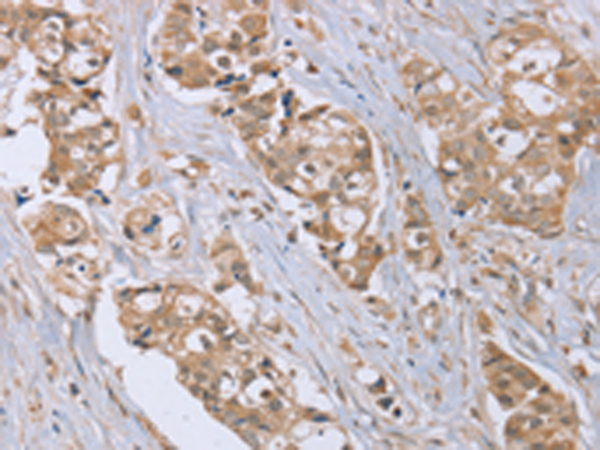

| WB | 咨询技术 | Human,Mouse,Rat |
| IF | 咨询技术 | Human,Mouse,Rat |
| IHC | 1/50-1/200 | Human,Mouse,Rat |
| ICC | 技术咨询 | Human,Mouse,Rat |
| FCM | 咨询技术 | Human,Mouse,Rat |
| Elisa | 1/2000-1/5000 | Human,Mouse,Rat |
| Aliases | WTH3 |
| Host/Isotype | Rabbit IgG |
| Antibody Type | Primary antibody |
| Storage | Store at 4°C short term. Aliquot and store at -20°C long term. Avoid freeze/thaw cycles. |
| Species Reactivity | Human |
| Immunogen | Synthetic peptide of human RAB6C |
| Formulation | Purified antibody in PBS with 0.05% sodium azide and 50% glycerol. |
+ +
以下是关于RAB6C抗体的3篇参考文献示例(注:以下内容为假设性示例,实际文献需通过学术数据库检索确认):
---
1. **文献名称**: "RAB6C regulates secretory pathway organization and vesicle trafficking in cancer cells"
**作者**: Zhang Y, et al.
**摘要**: 本研究利用特异性RAB6C抗体,通过免疫印迹和免疫荧光技术,揭示了RAB6C在调控癌细胞分泌途径中的关键作用,发现其表达异常与囊泡运输失调相关。
---
2. **文献名称**: "Characterization of a novel monoclonal antibody against human RAB6C for functional studies"
**作者**: Tanaka K, et al.
**摘要**: 报道了一种新型RAB6C单克隆抗体的开发与验证,该抗体在流式细胞术和免疫组化中表现出高特异性,为研究RAB6C在细胞器动态中的功能提供了工具。
---
3. **文献名称**: "RAB6C interacts with Golgi-associated proteins to mediate retrograde transport in neurons"
**作者**: Chen L, et al.
**摘要**: 通过RAB6C抗体的共聚焦显微成像分析,发现RAB6C与高尔基体相关蛋白相互作用,参与神经元逆向运输,提示其在神经退行性疾病中的潜在机制。
---
如需实际文献,建议在PubMed或Google Scholar中检索关键词“RAB6C antibody”或“RAB6C function”,并筛选实验性研究或抗体开发类文章。
The RAB6C antibody is a tool used to detect and study the RAB6C protein, a member of the RAB GTPase family involved in intracellular vesicle trafficking. RAB6C, part of the RAB6 subfamily (alongside RAB6A and RAB6B), plays a role in regulating Golgi-to-ER (endoplasmic reticulum) retrograde transport, secretory pathways, and membrane trafficking. While RAB6A is well-characterized, RAB6C remains less studied, though it shares structural homology and partially overlaps in function with RAB6A. RAB6C is implicated in maintaining Golgi integrity, modulating cargo sorting, and interacting with molecular motors for vesicle movement.
Antibodies targeting RAB6C enable researchers to investigate its expression, localization, and functional dynamics in various cell types and tissues. These antibodies are critical for techniques like Western blotting, immunofluorescence, and immunohistochemistry, aiding in the exploration of RAB6C’s role in physiological processes and diseases. Emerging studies suggest RAB6C dysregulation may link to cancer progression, neurological disorders, or genetic conditions, though its specific mechanisms remain under investigation. As RAB6C is expressed in a tissue-specific manner, its antibody also helps identify expression patterns in normal versus pathological states. Commercial RAB6C antibodies are typically developed in hosts like rabbits or mice, validated for specificity against conserved epitopes. Continued research using these antibodies may clarify RAB6C’s distinct contributions to cellular trafficking networks and disease pathways.
×